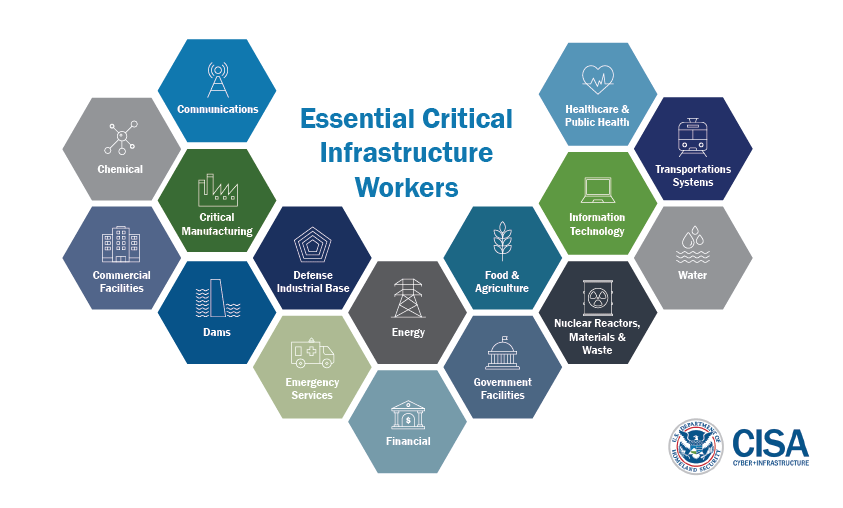
3.29.20- Brad Shipp- NESA
More and more states and localities respond to the COVID 19 pandemic by restricting which businesses are able to operate.
The Cybersecurity and Infrastructure Security Agency (CISA) issued guidance on identification of essential critical infrastructure workers during covid-19 response. Click here to see the full Document
The CISA breaks out workers by industry sector. In other words the designation may depend on the industry sector.
This document is being widely used by states and localities to define “Essential Workers”
In Summary – Security, Fire, Medical alarms are designated as essential. Communications – phone, data and video are designated as essential. Repairs to automation systems that impact security or HVAC would also be essential.
Updated Second DHS Guidance on the Essential Critical Infrastructure Workforce (03/28/2020)
Updated DHS Guidance on the Essential Critical Infrastructure Workforce directly refers to electronic security and life safety security personnel)
- LAW ENFORCEMENT, PUBLIC SAFETY, AND OTHER FIRST RESPONDERS (Page 6)
- Workers – including contracted vendors — who maintain, manufacture, or supply equipment and services supporting law enforcement emergency service and response operations (to include electronic security and life safety security personnel).
- COMMUNICATIONS AND INFORMATION TECHNOLOGY (Page 11)
Communications: Workers providing electronic security, fire, monitoring and life safety services, and to ensure physical security, cleanliness and safety of facilities and personnel, including temporary licensing waivers for security personnel to work in other States of Municipalities.
Services provided by our industry are included:
Other Community-Based Government Operations And Essential Functions
- Workers to ensure continuity of building functions
- Security staff to maintain building access control and physical security measures
Law Enforcement, Public Safety, First Responders
- Workers – including contracted vendors — who maintain, manufacture, or supply equipment and services
supporting law enforcement emergency service and response operations (to include electronic security and life
safety security personnel).
Public Works
- Workers such as plumbers, electricians, exterminators, and other service providers who provide services that are necessary to maintaining the safety, sanitation, and essential operation of residences
Healthcare / Public Health
- Workers performing security, incident management, and emergency operations functions at or on behalf of healthcare entities including healthcare coalitions, who cannot practically work remotely
Communications
- Maintenance of communications infrastructure- including privately owned and maintained communication systems- supported by technicians, operators, call-centers, wireline and wireless providers, cable service providers, satellite operations, undersea cable landing stations, Internet Exchange Points, and manufacturers and distributors of communications equipment
- Installation, maintenance and repair technicians that establish, support or repair service as needed
- Workers providing electronic security, fire, monitoring and life safety services, and to ensure physical
security, cleanliness and safety of facilities and personnel, including temporary licensing waivers for
security personnel to work in other States or Municipalities. - Dispatchers involved with service repair and restoration
Information Technology
- Workers supporting communications systems and information technology used by law enforcement, public safety, medical, energy and other critical industries
Energy
Petroleum workers:
- Petroleum security operations center employees and workers who support emergency response services
This is guidance to state and local governments. Local implementation may vary.
Shelter in Place
if you are operating in an area that has imposed a shelter in place order consider providing your employees with a letter.
The Monitoring Association (TMA) Sample Letters: Any company using these samples must edit them for their own use and must perform their own internal review/due diligence after their edits and customization.
